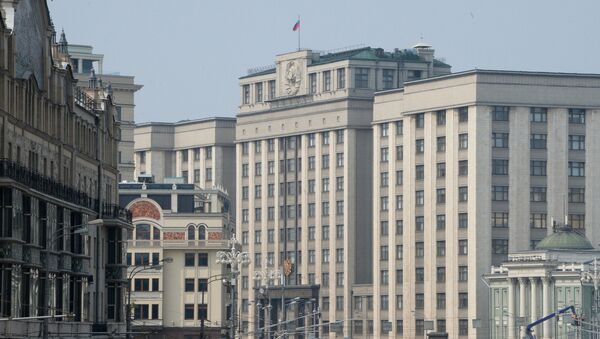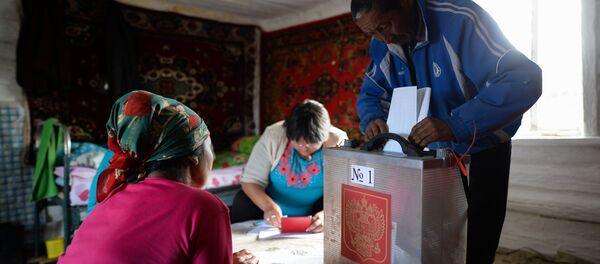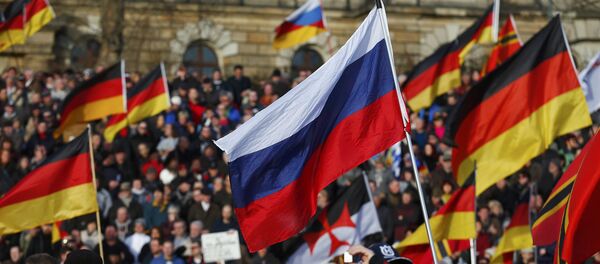Under the Constitution, 450 lawmakers are elected to the State Duma. Of these, 225 lawmakers are elected in single-mandate electoral districts (one deputy per district), and the other 225 lawmakers are elected in the federal electoral district proportionately to the share of votes given to federal party lists.
State Duma elections are prepared and conducted by the Central Election Commission; election commissions of the constituent entities of the Russian Federation; district election commissions; territorial election commissions or municipal election commissions that exercise the authority of territorial commissions; and polling station commissions.
RIGHT TO ELECT, BE ELECTED
Citizens of Russia who have reached the age of 18 by election day can elect lawmakers to the State Duma. In single-mandate electoral districts, lawmakers can be elected by those who have reached the age of 18 by election day and live in the given electoral district. Russian citizens who live or are traveling outside Russia have the same rights as citizens in Russia in State Duma elections.
Russian citizens who have reached the age of 21 as of election day can be elected to the State Duma. Russian citizens who have foreign citizenship or hold a residence permit or any other documents allowing them to permanently reside in a foreign state cannot be elected to the State Duma.
The following citizens are ineligible for State Duma office: those convicted of grave or serious crimes and whose sentences have not expired or have not been expunged by election day; those who have served their sentences for a serious crime or whose criminal records have been expunged less than 10 years before election day; those who have served their sentences for a grave crime or whose criminal records have been expunged less than 15 years before election day; those who have been sentenced for crimes of extremism and whose sentences have not expired or have not been expunged by election day; those who have been given administrative penalties for minor extremist offenses; those who have been accused by a court of violating Federal Law On Basic Guarantees of Electoral Rights and the Right of the Citizens of the Russian Federation to Participate in a Referendum.
Russian citizens can be nominated as candidates directly or under federal lists. Direct nomination includes self-nomination and nomination by political parties. Russian citizens can only be nominated under federal lists by political parties.
Decisions to nominate candidates under the federal list or for single-mandate electoral districts shall be taken by secret ballot at political party conferences. A political party can nominate only one candidate in a single-mandate district.
Russian citizens can nominate themselves for a single-mandate electoral district, but only in one such district.
Political parties must collect at least 200,000 signatures in favor of its federal list of candidates, with no more than 7,000 signatures of voters registered in a given region.
The number of signatures collected in a single-mandate district by parties or self-nominated candidates must amount to at least 3 percent of the total number of voters registered in the given electoral district, or at least 3,000 signatures in a district with less than 100,000 registered voters. A party that has lawmakers in the current State Duma, or is not represented in the lower house but won at least 3 percent of the vote in the previous election, or has a party group in at least one region, is not required to collect signatures.
CAMPAIGN
Political parties that have registered their federal lists of candidates or nominated candidates for single-mandate districts shall publish their election programs no later than 20 days before the election day.
Election campaign advertising can be held on television and radio, published in the print and online media; at special public events; through the production and distribution of print, audio, and video campaign materials; or any other method that is not prohibited by the federal law. Campaigning is prohibited on the day prior to and on the election day.
Voters cast their ballots at polling stations.
The venue for voting shall be provided pro bono to the district election commission by the head of the given district or, in cases that are stipulated by law, by the commander of a military unit, ship captain, head of a polar station, or heads of Russian diplomatic or consular offices outside Russia.
Video monitoring and broadcasting equipment can be installed at polling stations.
The ballot for voting in a federal election district shall include the names of the political parties that have registered federal lists of candidates and monochrome logos for these parties, in the order determined by lots. The lots will be drawn by the Central Election Commission of Russia in the presence of the political parties’ authorized representatives.
Ballots shall be printed in the Russian language. They can also be printed in the language of a national republic by decision of this republic’s election commission, or, if necessary, in the languages of small ethnic groups for voting in areas that are densely populated by these groups.
Voters who are unable to come to their polling stations on election day can request permission to vote at a polling station in the place of his or her residence on election day.
Polling stations must remain open for voting from 8 a.m. to 8 p.m. local time.
Ballots are issued to voters upon the presentation of their passports or any other identification form, or an absentee voting certificate.
Voters shall cast their ballots personally. Voting by proxy is not permitted. Voters shall drop their ballots into a closed and sealed stationary ballot box.
The election commission must create conditions for voting for people with health problems or disabilities who cannot come to a polling station unassisted.
VOTES COUNTING
The votes shall be counted openly and publicly.
The registered candidate who receives the highest number of votes in the given single-mandate electoral district shall be declared the winner. If several candidates tie, victory shall be assigned to the candidate who was registered first.
The federal lists of candidates each of whom received 5 or more percent of the total number of votes cast in the federal electoral district, provided there were at least two such lists and that over 50 percent of the votes were cast in total for these lists, will be allowed to participate in the distribution of lawmakers' mandates. Any other federal lists of candidates will be ineligible for the distribution of mandates.
If 50 percent of the votes or less were cast for the federal lists of candidates each of whom received 5 or more percent of the total number of votes cast in the federal electoral district, the right to participate in the distribution of mandates will be granted not only to these candidates but also to the candidates who received less than 5 percent of the vote, until the number of votes cast for the federal lists of candidates who will participate in the distribution of mandates exceeds 50 percent of the total number of voters who attended the elections.
The federal lists of candidates who participate in the distribution of mandates shall be assigned mandates in keeping with the proportionate method.
If elections in a given electoral district are declared invalid or void, or if their results have been annulled, the Central Election Commission shall call for a repeat election in this electoral district.
After the protocol on election results in a given electoral district is signed, the Central Election Commission and district commissions shall immediately send notification thereof to the registered candidates who were elected to the State Duma.






